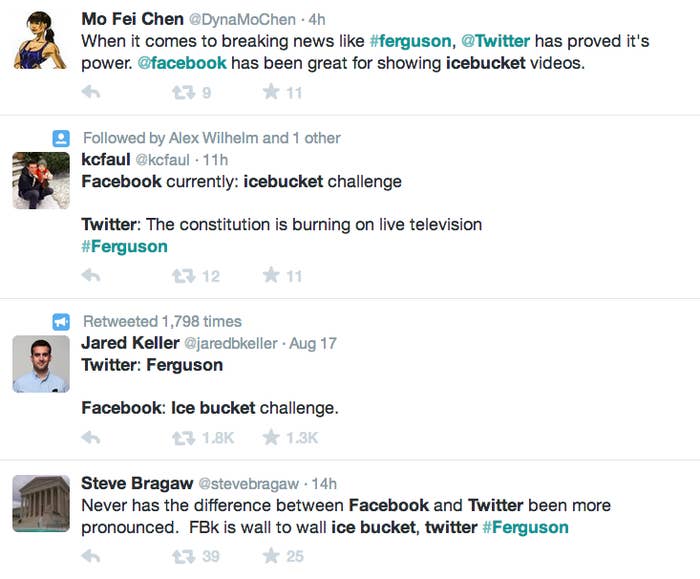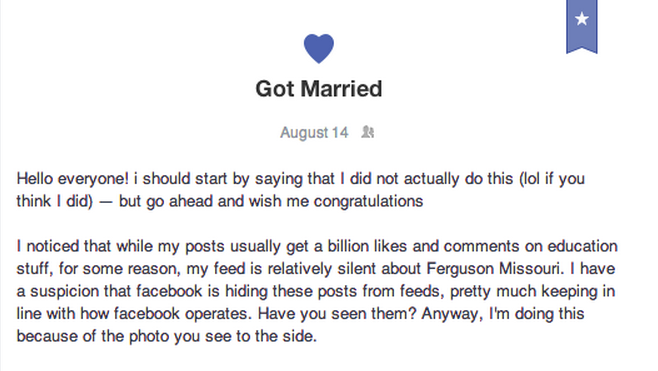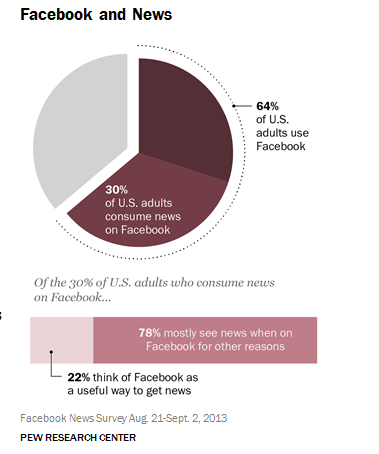
If you spend any significant amount of time on Twitter and Facebook, you've probably come to the same conclusion that many are reaching over the past week: Twitter has been dominated by relentless, riveting, in-depth, second-by-second coverage of the Ferguson protests and police clash, documenting the year's most important domestic news story, while Facebook has largely been dominated by life events, viral news, and buckets full of ice water.
And that's fine! Or at least it would be, if it weren't for Facebook's consistent efforts to compete with Twitter and be considered the internet's primary destination for social news.
Over the past few years, even casual observers have watched as Twitter and Facebook's services have borrowed design and platform features from each other, making them look, in some instances, almost like the same service. Take Twitter's recently re-designed profiles from this past April:
Great comparison of new Twitter and Facebook profiles.
Last January Facebook aped Twitter's trending topics as well in order "to surface interesting and relevant conversations in order to help you discover the best content from all across Facebook." The social network also hired the Wall Street Journal's Liz Heron to help Facebook form partnerships with media companies and journalists. Just weeks later, Facebook launched FB Newswire, powered by the social content discovery platform, Storyful. Per the Facebook blog post:
News is finding a bigger audience on Facebook than ever before. Journalists and media organizations have become an integral part of Facebook, which is visible in features like Trending Topics, improvements to Pages, and recent changes to News Feed.
But despite these very public efforts, Facebook has largely failed to reflect the centrality of Michael Brown's murder, Ferguson protests, and police backlash to the American news conversation, or to reflect the importance conferred on the story by both Twitter and editors of publications of all sorts. Facebook's algorithmically controlled News Feed and Trending Topics have, in certain cases, been behind on Ferguson news (a Trending Topic last night while protesters and journalists were being teargassed, noted that protests were "relatively peaceful") and often ignored Ferguson altogether. In an informal poll of BuzzFeed's editorial staff, out of 38 accounts, Ferguson only appeared in Facebook's Trending Topics 21 times (often well below NFL preseason, Taylor Swift, and ASAP Ferg news).
For many, there's also a lack of relevant Ferguson coverage in News Feed. One colleague's Facebook friend — who does not work in media — was so frustrated by the lack of Ferguson news that she created a fake life event saying she was married in order to post her thoughts about the protests. It worked. The fake marriage announcement (which is heavily weighted by Facebook) has stayed near the top of my colleague's feed for some time.

So what's to blame? A number of factors, it seems, ones that reflect both Facebook's design and the user preferences it is so adept at tracking.
It all comes down to the complex set of algorithms, which are designed to show you content that you're likely to care about. News from pages you've liked (the reason for a lot of that preseason NFL news), things that are popular among your friend group — especially when that content is also popular across greater Facebook. If it's popular in your social graph, there's a reasonable chance it will also end up in your greater stream (choose your friends wisely!).
If your friends don't interact with the news, by either commenting or liking it, you're less likely to see it, meaning that a decent part of the reason people aren't seeing a glut of Ferguson coverage is that people don't want to see it. Or that they don't care. Or that they're sending some other signal that Facebook takes to mean that the story is undermining their user experience. That, for better or worse, is the algorithm at work.
The ALS Ice Bucket Challenge, on the other hand, is a phenomenon that is almost flawlessly tailored to Facebook. Not only does it have friends, celebrities, and a goofy but ultimately warm and fuzzy premise, it also makes use of Facebook's native video player, a high engagement part of the platform, which is also given weight by Facebook's algorithms, due to its popularity among users. It's a perfect confluence factors for algorithmic dominance.
And that's fine! Facebook and Twitter are still different platforms with different origins and functions. There's no rule that Facebook has to be a place for second-by-second breaking news coverage and reports from the ground. Nor does Facebook have any moral obligation to force a specific news event upon its users. In fact, it is designed to do the very opposite by design: It wants to give you what you want! And, according to a recent experiment conducted by the Washington Post's Tim Herrera, often times that means content that's more than a few days old.
But to suggest that Facebook is the internet's best destination for breaking news is, at this moment, disingenuous. Has Facebook surfaced quality Ferguson content in News Feed and Trending Topics? Sometimes! Other times, like last night, it was entirely absent from my News Feed and, save for two posts from the conspiracy site Infowars and a link to John Oliver's monologue on Last Week Tonight, there was little of value in Trending Topics.

Whatever the quality, Facebook's importance as a news source is only continuing to grow. A Pew report from nearly a year ago shows that 30% of U.S. adults admit to consuming news on Facebook, a number that's surely grown in the past year. And there's little doubt that figures like these numbers have something to do with Facebook's investment in News over the past year. But despite its intentions, Facebook's cryptic algorithms remain quite distant from the editorial judgement that seems to be what executives there mean when they talk about news. When BuzzFeed reached out to Facebook for this piece to ask for clarification on Ferguson coverage in News Feed and Trending topics with regard to the algorithm, a spokesperson for the social network could only note that content that appears in Trending Topics have no influence on what an individual sees in her News Feed. Facebook also provided BuzzFeed with a FAQ page for Trending Topics and News Feed.
But one senior Facebook employee appeared to acknowledge that the social network knows it has a Ferguson problem. Facebook product manager, Mike Hudack (who this past May publically lamented the "hollowing out" of most major newspapers and the failure of new internet-native media) commented that the company was "actually working on it," in response to complaints about the lack of hard news.
Perhaps the change will come in the form of a more prominent FB Newswire, which has done perhaps the best job of any Facebook platform in covering Ferguson. Or perhaps very little will change. After all, Facebook, for the most part, asks us what we want to see and projects that image back to us. For some, Facebook's shortcomings on Ferguson coverage is a moral issue, for others it's a net neutrality issue or a media punditry issue. And for some — and I'd guess a large number — we may have to accept that it's not an issue at all.
